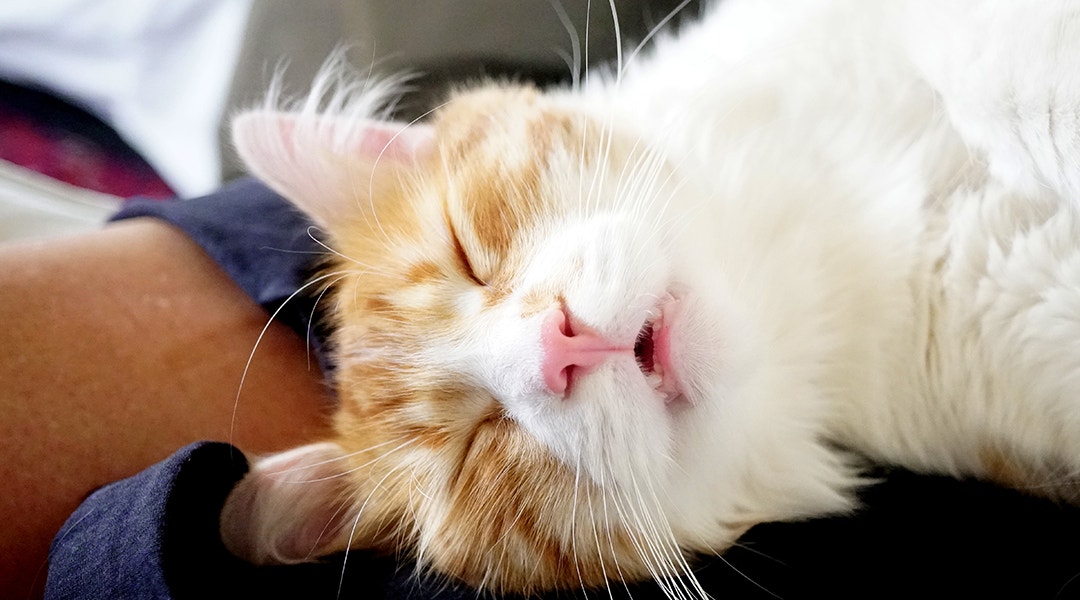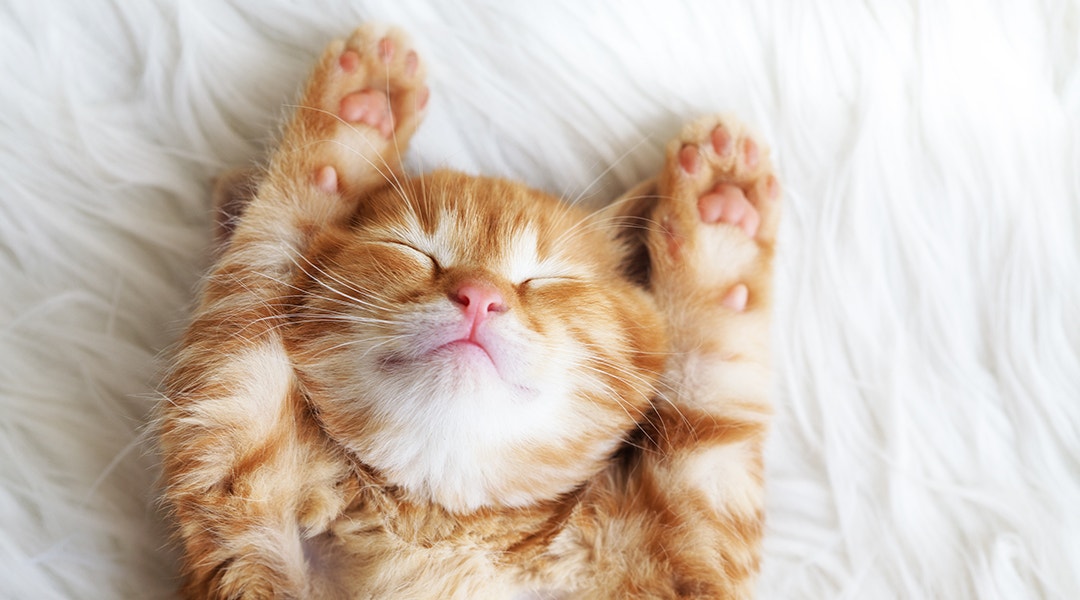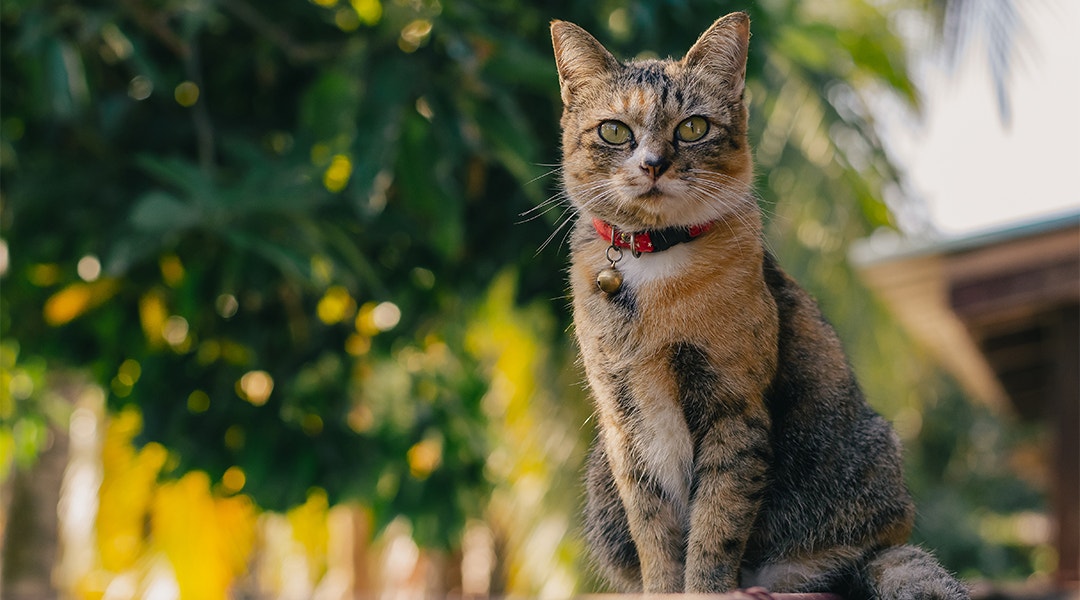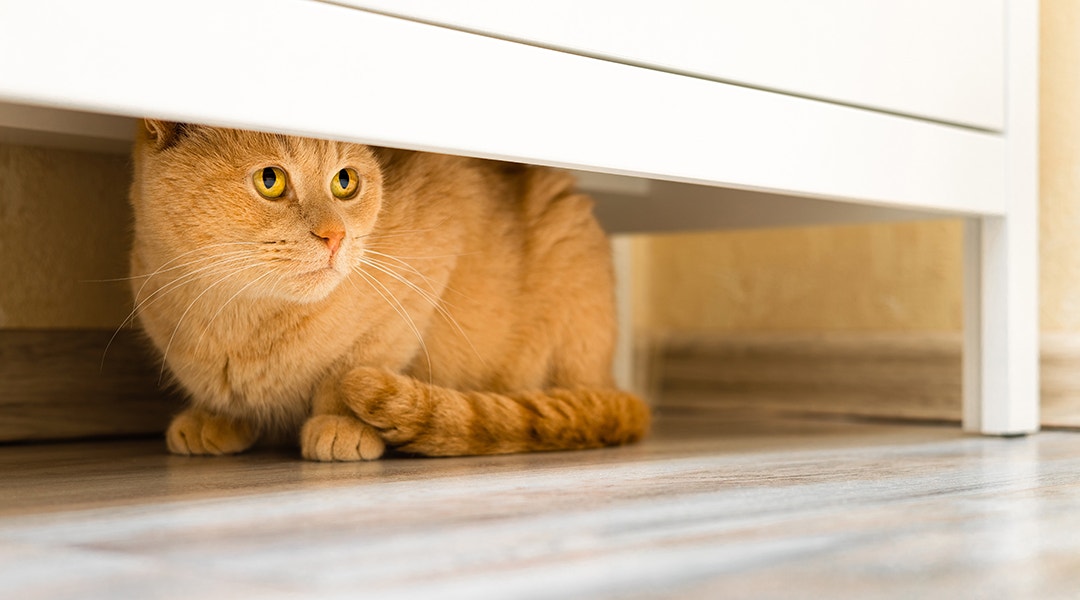We know that cats love to sleep, but what you might be surprised to hear during those 12-16 hours a day is the sound of your cat snoring. If you’re wondering if it’s normal for cats to snore, the answer is yes - sometimes cats do snore. Just like humans, our feline friends can also make sounds while sleeping, especially in strange sleeping positions. This is because the tissues in their upper airway relax and vibrate as they breathe.
However, if your cat’s snoring is new, louder than usual or accompanied by other symptoms, you should seek veterinary advice. There may be other causes contributing to the behaviour. Read on to understand more about snoring, and check out our article on other cat noises.
Do cats snore?
You may find that cats do snore in certain situations, and it’s usually just a quirk. The tissues in your cat’s upper airways relax as they sleep, including in the back of their mouth, throat and nose, which can cause vibrations. It’s especially common when your cat’s in deep or REM sleep, and if they are in strange sleeping positions. Since the sound is similar, you may want to find out why cats purr, too.
However, there can be other causes of cat snoring. Certain cat breeds are brachycephalic, like British Shorthairs, Himalayans and Persians, which means they have flatter faces and smaller noses. Since this makes their nasal passages shorter, they are more prone to snoring. Other health conditions like allergies, infections, respiratory issues and obesity can also cause cats to snore loudly.
Generally, it can be normal for cats to snore when they snooze, but if it’s a new or sudden behaviour and there are other symptoms like coughing, sneezing or changes in behaviour, you should consult a veterinarian. You can also look out for other actions, such as cats drooling.
Why does my cat snore?
There are a few potential answers to ‘why my cat snores’, including their breed and anatomy, sleeping positions, weight, allergies and medical conditions. It’s important to determine what is causing your cat’s snoring. It can also help to learn why cats meow, so you can better understand their moods.
Breed & anatomy
As mentioned, certain cat breeds, such as brachycephalic cats, can be more prone to snoring due to their facial structure. This includes British Shorthairs, Himalayans and Persians who have flatter faces and smaller nostrils. With shorter nasal passages, their airways are more narrow and can lead to cat snoring.
Sleeping positions
Since they sleep so much, as well as their natural flexibility, cats can get creative with their sleeping positions. You may find your cat is snoring if they’re curled up, sleeping on their back or their head is tucked in. If your cat is resting their head in a way that partially blocks their airways, it can make your cat snore loudly. You’ll know if this is the case if your cat’s snoring increases in frequency and volume, but then stops when they change position.
Weight
Overweight cats, or cats that are diagnosed with obesity, usually tend to snore a lot because of the excess fat around their neck and throat. This can narrow the airway and cause vibrations while your cat is breathing, causing louder and more frequent snoring. If you’re concerned about your cat’s weight, consult a veterinarian for advice.
Allergies
Cats can have allergies too, especially to common allergens like dust, pollen, mould or certain foods. If your cat’s allergies are triggered, their nasal passages can become inflamed, and this can cause nasal congestion and irritation. It could also be why your cat is sneezing. It’s important to consult a veterinarian if you suspect your cat has allergies.
Medical conditions
Certain medical conditions can contribute to cats snoring, especially respiratory illness, bacterial or fungal infections, nasal inflammation and chronic conditions such as asthma. Nasal polyps, masses and tumours can also cause a blockage in the nasal canal, as well as foreign objects, and can lead to snoring. We discuss when snoring can be worrying below.
Normal vs. concerning snoring
It’s important to distinguish between your cat’s regular snoring patterns and those that might indicate a health problem. For instance, cats do snore in their deep sleep, and this is most likely normal, especially if it’s quite gentle.
However, if all of a sudden you can hear your cat snoring loudly and persistently, and they usually don’t at all, there may be something else going on. If your cat is snoring and also coughing or sneezing, experiencing discharge from their eyes or nose, has laboured breathing, seems distressed or is showing changes in their appetite or behaviour, you should take them to the veterinarian immediately. A cat that won’t eat is usually a tell-tale sign that something is wrong.
Signs you should take your snoring cat to the vet
There are some signs that you should take your snoring cat to the vet, including some physical symptoms and behavioural changes. If you notice any of these alongside your cat snoring loudly, a veterinary visit is necessary.
- Coughing or sneezing
- Eye or nasal discharge
- Difficulty in breathing
- Wheezing or panting
- Laboured breathing
- Open-mouth breathing
- Sudden snoring behaviours
- Snoring is increasing in volume
- Swelling in the face
- Changes in appetite
- Changes in water intake
- Weakness or lethargy
- Unusual vocalisations
Persistent symptoms
While it’s normal for cats to snore, if there are other persistent symptoms, such as wheezing, laboured or open-mouth breathing, this should be taken seriously. These are signs of respiratory distress and suggest that there could be an infection or blockage. It’s important to seek immediate veterinary attention.
Behavioral changes
If your cat is snoring but also displaying changes in their behaviour, this shouldn’t be overlooked. For instance, if your cat shows reduced activity, is playing less, hiding more often, or if they have changes in their drinking, eating or grooming habits, there may be an underlying cause. Your cat may be experiencing distress or discomfort from an illness and will need veterinary attention.
How to treat snoring in cats
There are different treatment options available to manage snoring in cats, but it depends on the cause. To treat your cat’s snoring, you’ll need to find the root cause in order to determine whether some lifestyle adjustments can help or if your cat will need medical intervention.
Lifestyle modifications
If it’s a mild situation, some lifestyle adjustments like managing your cat’s weight or creating a better sleep environment can treat your cat’s snoring. For weight management, you can improve your cat’s diet or increase the amount of exercise they’re getting, under veterinary guidance. You can also provide better sleeping conditions by ensuring their space is clean and dust-free, with cosy and supportive surfaces for their naps.
Medical treatments
However, if there are health issues like allergies, infections, illness or anatomical problems, you’ll need medical intervention from a veterinarian. In these cases, the vet can prescribe medicine such as antihistamines, antibiotics or anti-inflammatories. If the structural problem is severe, there are also surgical options to improve your cat’s breathing and treat their snoring.
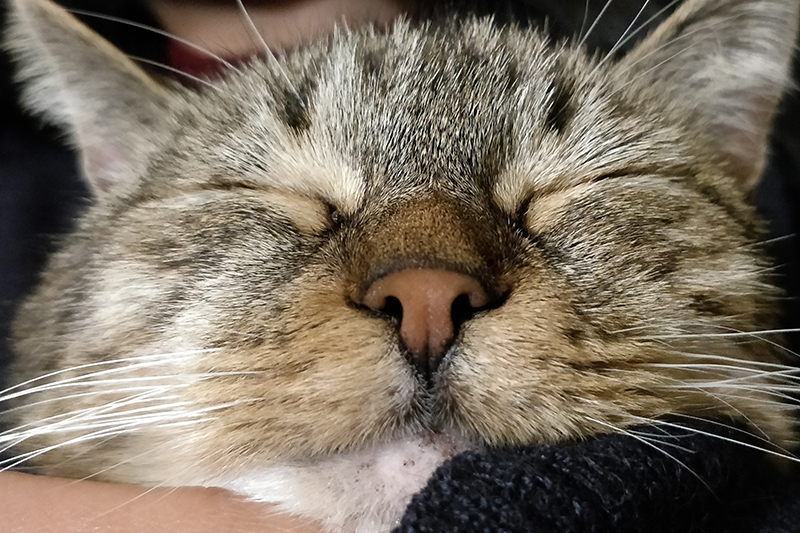
How to prevent snoring in cats
While cats do snore, if you want to prevent snoring in cats, then you’ll need to treat the potential common causes and take preventative measures. Your cat will benefit from regular check-ups at the vet, weight management, a healthy and balanced diet and plenty of exercise.
Regular health checkups
It’s important to take your cat to the veterinarian regularly, as routine visits and observations can help monitor their health. Your vet can perform health checks to detect any conditions or issues early on, which can be key in treating them effectively. If your vet suspects allergies or infections, they can provide guidance and medication accordingly.
It’s also an opportunity to keep your cat up to date with their vaccinations, preventative parasite treatments and dental hygiene checks, all of which can improve their health and well-being and reduce the likelihood of snoring.
Environmental enhancements
If your cat’s snoring is not a medical issue, then there are ways to enhance their environment to create healthier sleeping habits. For instance, your cat may benefit from hypoallergenic bedding to minimise allergens and dust. Make sure to keep their sleeping area clean as well. You can also use humidifiers to improve the air moisture, which can prevent nasal dryness and irritation and reduce snoring. Once your cat can breathe better, their sleep quality will be better, too.
Snoring in cats summary
If you’re wondering ‘why does my cat snore?’, rest assured that it’s absolutely normal for cats to snore. As long as they are otherwise healthy and happy, snoring may just be one of your cat’s cute little quirks. Learn more about how long cats sleep for, and you won’t be surprised that they snore some of the time.
However, as a cat parent, it’s important to observe your cat closely so you notice any unusual symptoms or changes in their behaviour. This can signal if there is something else going on that’s causing your cat to snore loudly. If the snoring is new or has gotten worse, make sure to consult with a veterinarian for guidance.
Snoring in cats FAQs
Is it normal for your cat to snore?
Yes, it is normal for your cat to snore. When cats sleep, the tissue in their upper airways may relax and lead to vibrations as they breathe. However, if snoring is a new behaviour or there are other unusual symptoms alongside it, you should check with a veterinarian.
What does a congested cat sound like?
A congested cat may sound like it has a blocked or stuffy nose. You may hear sounds like your cat snoring, wheezing or rattling, and their breathing may seem laboured or louder than usual. This is likely due to allergies, irritants or infections affecting the nasal passages.
Why does my cat sound like their nose is stuffed up?
If your cat sounds like their nose is stuffed up, it’s most likely because of an allergy, irritant or infection. These conditions can cause your cat’s nasal passages to become inflamed or lead to mucus build-up, resulting in sounds of snoring, wheezing or sneezing while they breathe or sleep.
What are the signs of cat asthma?
There are certain signs of asthma in cats, including coughing, wheezing, laboured or open-mouth breathing, and potentially lethargy. Asthma attacks can occur suddenly and can be severe if not managed properly. If you notice your cat experiences respiratory distress, you should seek veterinary care for a proper diagnosis and guidance.

